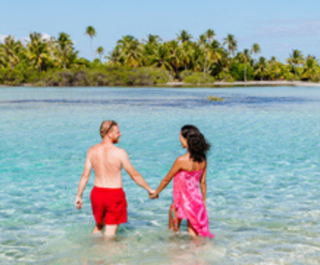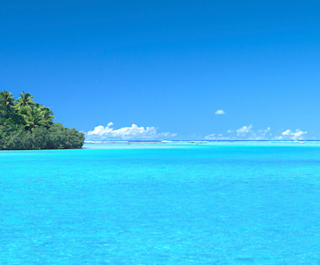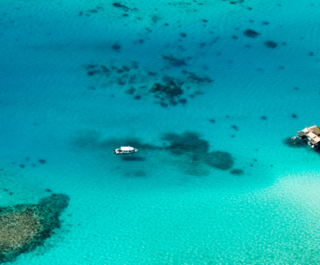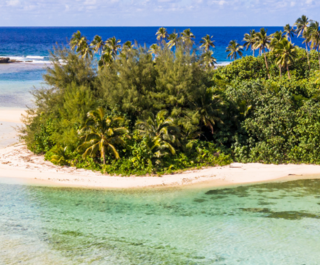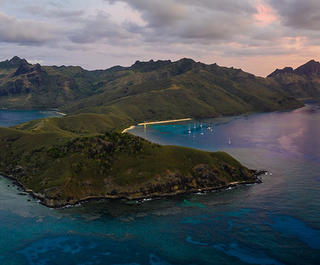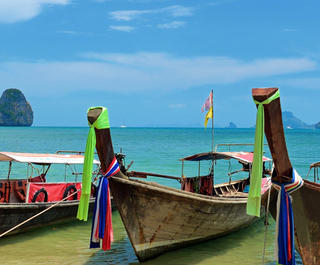
24 May 2022
Read Time: 6.8 mins
You’ve probably heard of, and seen pictures of, the beautiful blue cenotes in Mexico, blue holes in Egypt, Belize, Malta and more. But did you know that there are spectacular blue holes much closer to home? Our South Pacific island neighbour of Vanuatu is arguably the South Pacific’s best kept secret, harbouring some of the world’s most spectacular blue swimming holes. And the best bit is they’re just over three hours flight from Australia!
How many blue holes are in Vanuatu?
There are blue holes all over Vanuatu, but the best blue holes are on the island of Espiritu Santo (known locally as The Big Island).
There are five blue holes on Espiritu Santo, the most famous of which is the Nanda Blue Hole. What makes these blue holes so spectacular is they are so blue in colour that they appear entirely unnatural. The colour is caused by freshwater coming to the surface of ancient underground volcanic mountain ranges through multiple layers of limestone.
Which Vanuatu lagoons can you swim in?
While the water may look unnaturally blue, it’s perfectly safe to swim in most, if not all of the blue holes. In fact, it’s safe to swim in much of the blue waters around Vanuatu, from white sandy beaches to blue holes, which is what makes it such a perfect holiday destination. If you’re unsure, ask the friendly staff at your resort, or your local tour guide.
How do you get to Espiritu Santo’s blue holes?
The frontier town of Luganville is the second largest town in Vanuatu, after the capital of Port Vila. In fact, Air Vanuatu operates flights directly from Australia to Luganville as well as Port Vila, making it easy to reach these beautiful blue holes without having to transit from another island.
The blue holes are easily accessible by car from most of the island’s resorts, even private island resorts, which offer boat transfers to Luganville where you can arrange for a local driver to take you to the blue holes. Some of the smaller island resorts might even be able to take you to blue holes on the outer islands, only accessible by boat!
Nanda Blue Hole
Probably the most famous is the Nanda Blue Hole, located about a 40-minute drive north of Luganville. The deeper the hole, the bluer its water will be. Nanda is reported to be between 13 and 18 metres in depth, but thanks to its location near the coast and plenty of sunlight, you can see right to the bottom.
Describing the water here as crystal clear is in no way an understatement. Be warned the water can be fresh, so locals will recommend you jump straight in, and be sure to ask your resort to borrow a snorkel to explore. There is a timber boardwalk with decking built around most of the hole, which makes a great place for sunbathing and warming up after your dip.
Most of the blue holes require an entrance fee and only take cash. At Nanda, you pay at the small house to the side of the road. It’s a good idea to confirm with your resort or driver how much the entrance fees will be to ensure you have enough cash.
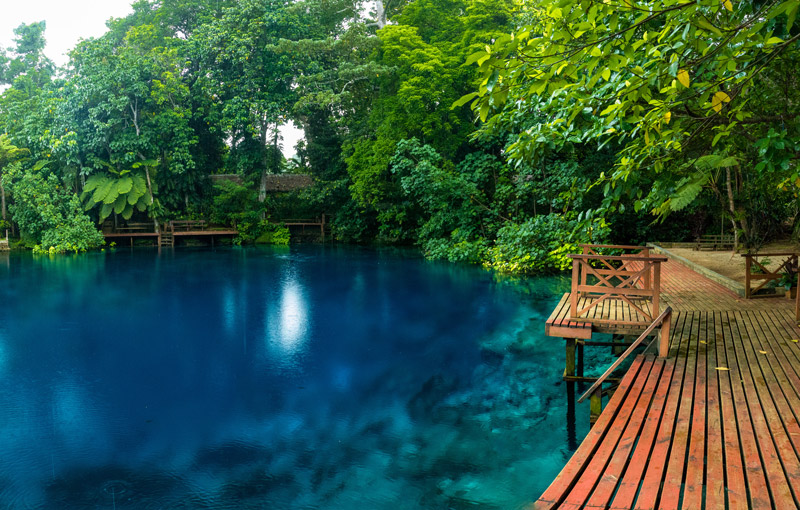 Nanda Blue hole. Image: Getty Images
Nanda Blue hole. Image: Getty ImagesRiri Blue Hole
About a 30-minute drive from Luganville, Riri isn’t as well signposted or as popular as the Nanda Blue Hole. There are two ways you can enter this lagoon, – by walking, or on an outrigger canoe. While the entrance fee here is less than Nanda, it works out to be about the same if you choose to take the canoe – which we highly recommend for the peaceful experience. This blue hole is less developed than Nanda, mostly surrounded by dense jungle, with a rope swing, making it an authentic experience.
Matevulu Blue Hole
Situated halfway between the Riri and Nanda blue holes, Matevulu isn’t as popular as the others, however it’s no less beautiful. Tucked away in the jungle, the entrance isn’t signposted, meaning you have a good chance of exploring this big blue hole all to yourself. There’s a rope swing for jumping in and some rock platforms to laze about on.
RELATED: Fiji or Vanuatu: Which would you choose?
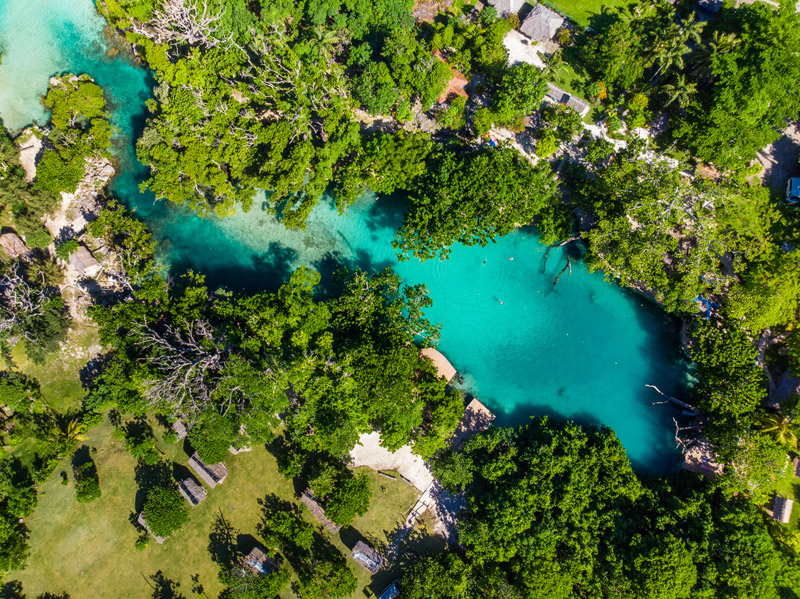 Vanuatu's Blue Lagoon. Image: Getty
Vanuatu's Blue Lagoon. Image: GettyWhere is Vanuatu’s Blue Lagoon?
It’s not just Espiritu Santo’s blue holes that are worth a visit. In fact, if you’re stopping into Vanuatu on a cruise ship you’ll be docking in Port Vila, on the island of Efate, not Santo. But that doesn't mean you miss out completely on the azure waters of these swimming holes. In fact, just half an hour’s drive out of Port Vila is the Blue Lagoon Vanuatu prides itself on.
Larger than most of the blue holes on Espiritu Santo, Efate’s Blue Lagoon is about 70 metres long and 30 metres wide. It’s situated right beside the sea, which means the water changes from fresh and clear at low tide to salty and lighter in colour at high tide.
How do you get to the Blue Lagoon?
The Blue Lagoon is located a 45-minute drive out of Port Vila, so it’s a great half or full-day trip. You can hire a car or jump on a local tour if you prefer not to drive.
There are two sides to the lagoon, owned by two different families. Both require an entrance fee, though it doesn’t matter which side you enter, you are allowed to swim around the whole lagoon.
It’s quite well developed in that there are change rooms, toilet facilities, picnic tables and a grass area to spread out for the day. There are also kayaks for hire and plenty of rope swings to have some fun. Be sure to pack food and water, sunscreen and mosquito repellent though, as there aren’t any shops nearby.
If you’re not visiting on a cruise ship, it’s recommended to visit the blue lagoon on a day the cruise ships aren’t docked, as it’s understandably a popular destination and can get quite crowded.
What else do you need to know when visiting Vanuatu’s blue lagoons?
Getting around Vanuatu
There is no public transport system in Vanuatu, however, there are small private minivans that act as local buses. If you’re staying on one island for a few days and want to explore you can hire a car to take yourself around. If you’d prefer not to drive, there are plenty of local tour companies who can take you on a day tour to the blue holes and lagoon, alternatively, you can arrange for a driver to take you around the island for a day.
Take your snorkel
If you don’t want to pack your own, most resorts will allow you to borrow or hire a snorkel for the day when you visit the blue lagoon or the blue holes. While the water is crystal clear from above, many of them are home to small tropical fish, so a snorkel and even flippers will allow you to see them.
Pack a picnic
Unless you’re on a tour that provides lunch, it’s best to arrange with your resort to take a packed lunch and plenty of water when visiting the blue holes and lagoon, as they are quite remote without many places to stop in for lunch. Chat to the staff at your resort front desk the day before and they will happily arrange a snack pack lunch for you.
Carry cash
Most businesses in Vanuatu are very small local businesses without access to the internet and don’t offer EFTPOS payment. It’s best to get cash out in Port Vila or Luganville and chat to your resort about the current cost of entrance fees to the blue holes and lagoon, or other attractions you want to visit to ensure you have sufficient cash on you for the day.
Got kids? Take floaties
The blue holes and blue lagoon are quite deep, so if you’re travelling with little ones, make sure your equipped with floaties. Even for the big kids, a lilo or swim tube adds extra fun and relaxation.
Sun protection and insect repellent
Vanuatu is a tropical destination after all! The blue holes are surrounded by lush jungle, so mosquitos aren’t uncommon, and of course sunscreen is always recommended. It’s best to purchase these in Australia and take them with you as pharmacies are only located in the bigger towns and supplies can be expensive.
Is Vanuatu expensive to holiday in?
Vanuatu isn’t the cheapest of tropical island holidays, however it’s a dreamy all rounder destination. You can stay in a resort for a similar price to holidaying in Australia but explore some of the world’s most spectacular blue holes, pristine beaches, vibrant coral reefs, luxurious resorts, rich local cultural experiences and beautiful jungle.
Local attractions, food, drinks and transport, however, are significantly cheaper than Australia, meaning, even if you’re travelling with the whole family, you can enjoy plenty of tours and day trips to explore the beautiful islands.



